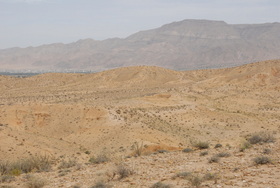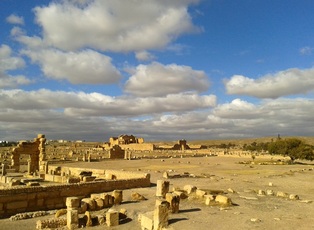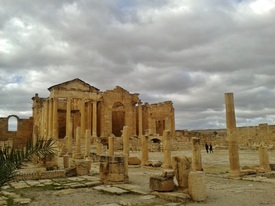
The road South to Kasserine ran through the dictionary definition of badlands. Despite occasional half-hearted showers, the ground remained angry and arid, with scratches of wiry esparto grass the only vegetation braving such an inhospitable environment. Dry wadis wandered between steep mesas, listless goats pretended they could make a living by lapping at stagnant pools and tearing up the memory of plants.
The scenery was dramatic, a post-apocalyptic Wild West, with glowering skies completing the look. The unhappy towns and single street villages we passed through completed the look: quite what people did out here remained mysterious, and houses seemed to sprout solely because two roads were crossing. The revolution grew in towns like these, anonymous and purposeless, much like their inhabitants. No jobs or support, but with a long history of Berber resistance to le pouvoir, stretching back to Roman times. If nature herself was that cruel a mistress, why would you put up with any crap from a master from some other world, a land of bounteous crops and fat livestock?
As you approach the Kasserine Pass, famous for being one of the most unhappy battles in World War II, some industry starts to pull itself together in an effort to give people something to do. Mostly it takes the form of turning esparto grass into something that people might actually want. Yet there is no reason to stick around in Kasserine itself, so on, always onwards, to Sbeitla, a short drive down the road, and home to a remarkably complete Roman town. The Arab town is strangely over-provided with places to eat, with ever more being built. Naturally, however, the quality restaurant that served alcohol had closed down. There appeared to be no reason why every street would be so stuffed with pizza joints and local eateries, but none of them seemed to be short of trade. I asked the man who sold tickets at the ruins if they got many tourists through, but he bemoaned the fact that they had stopped coming, and he could only rely on Allah to send them back.
The scenery was dramatic, a post-apocalyptic Wild West, with glowering skies completing the look. The unhappy towns and single street villages we passed through completed the look: quite what people did out here remained mysterious, and houses seemed to sprout solely because two roads were crossing. The revolution grew in towns like these, anonymous and purposeless, much like their inhabitants. No jobs or support, but with a long history of Berber resistance to le pouvoir, stretching back to Roman times. If nature herself was that cruel a mistress, why would you put up with any crap from a master from some other world, a land of bounteous crops and fat livestock?
As you approach the Kasserine Pass, famous for being one of the most unhappy battles in World War II, some industry starts to pull itself together in an effort to give people something to do. Mostly it takes the form of turning esparto grass into something that people might actually want. Yet there is no reason to stick around in Kasserine itself, so on, always onwards, to Sbeitla, a short drive down the road, and home to a remarkably complete Roman town. The Arab town is strangely over-provided with places to eat, with ever more being built. Naturally, however, the quality restaurant that served alcohol had closed down. There appeared to be no reason why every street would be so stuffed with pizza joints and local eateries, but none of them seemed to be short of trade. I asked the man who sold tickets at the ruins if they got many tourists through, but he bemoaned the fact that they had stopped coming, and he could only rely on Allah to send them back.

The tourists would do well to come back. The site is massive, all built from a beautiful honey coloured stone that glows in the sun. It is famous for its central group of temples in an almost complete forum. Stood amongst them, you can briefly imagine you are back in ancient times. Surrounding the forum are many massive bath houses, evoking a time when travellers, dusty after such a terrible journey, would clean up and ease their aches and pains. Between the bath houses, temples, forts and churches, the actual town is fairly skeletal and resolutely geometric, a fact that made me inappropriately think of Auschwitz. The fascist mind seems to be eternal, and seeks order in all things.

Still, when you stand in the forum you forget all these things and immerse yourself in living history. You can walk the colonnaded walk past old civil service offices around the main square, and climb the steps into the imperial temples and kneel at the altars to offer thanks to past Emperors. The touts trying to sell you Roman coins fresh from their brother's foundry seem very far away.
The next day I forgot that I was meant to be going to Sidi Bou Zid, the cradle of the Tunisian revolution. But there was nothing to see there anyway, just bored young Arabs whiling time away in cafés, looking out over nowheresville and dreaming of a better life. There was nothing to distinguish that town from any of the other dead-end places I'd been driving through, nothing that made those people more angry or ready for change. The whole of the western Tunisia was waiting, but it wasn't clear what for. I'm not sure they even knew themselves. Something had to give, or any one of them could be the spark for more trouble.
The next day I forgot that I was meant to be going to Sidi Bou Zid, the cradle of the Tunisian revolution. But there was nothing to see there anyway, just bored young Arabs whiling time away in cafés, looking out over nowheresville and dreaming of a better life. There was nothing to distinguish that town from any of the other dead-end places I'd been driving through, nothing that made those people more angry or ready for change. The whole of the western Tunisia was waiting, but it wasn't clear what for. I'm not sure they even knew themselves. Something had to give, or any one of them could be the spark for more trouble.

 RSS Feed
RSS Feed
